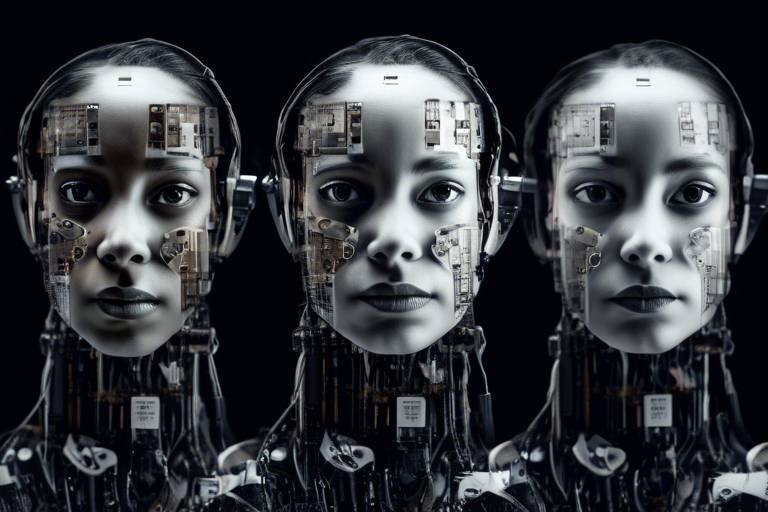Striking the Balance: AI, Ethics and Innovation
In today's rapidly evolving technological landscape, the intersection of artificial intelligence (AI), ethics, and innovation is more critical than ever. As AI continues to permeate various sectors, from healthcare to finance, it brings with it a plethora of opportunities and challenges. The question arises: how do we navigate this complex terrain without compromising our ethical standards? This article delves into the intricate relationship between AI, ethical considerations, and innovative practices, emphasizing the importance of maintaining a delicate balance for sustainable technological development.
AI is not just a buzzword; it is a transformative force that is reshaping industries and redefining the way we interact with technology. Imagine a world where machines can learn from data, make decisions, and even predict outcomes with remarkable accuracy. This is the reality that AI brings to the table. However, with great power comes great responsibility. Organizations must understand that leveraging AI effectively requires not only technical expertise but also a deep commitment to ethical principles. By doing so, they can harness the full potential of AI while addressing the potential pitfalls that come with it.
As we embark on this journey of exploration, it’s essential to recognize that ethics play a pivotal role in AI development. The technology we create must serve humanity positively, ensuring that it uplifts rather than undermines societal values. Key ethical principles should guide AI innovation and implementation, fostering an environment where technology aligns with human welfare. Consider this: if a self-driving car faces a dilemma, such as choosing between the safety of its passengers and that of pedestrians, how should it decide? This scenario highlights the pressing need for ethical frameworks that inform AI decision-making processes.
One of the cornerstones of ethical AI is transparency and accountability. When AI systems operate behind closed doors, it breeds mistrust and uncertainty. Clear communication about how AI makes decisions is crucial for building confidence among users. Developers must be accountable for their creations, ensuring that their algorithms are not only effective but also just. This is where transparency becomes a game-changer, as it allows stakeholders to understand the rationale behind AI-driven outcomes.
Data privacy and security are also paramount in the realm of AI applications. With vast amounts of personal data being processed, the challenge lies in safeguarding this information from breaches and misuse. Organizations must adopt best practices for data protection, such as encryption and anonymization, to ensure user trust. The consequences of failing to prioritize data privacy can be catastrophic, leading to reputational damage and legal repercussions. Thus, it is imperative for businesses to implement robust security measures that protect user data in AI-driven environments.
Another significant concern is the presence of bias in AI algorithms. If left unchecked, bias can lead to unfair treatment and discrimination, perpetuating societal inequalities. Addressing this issue requires a concerted effort to identify the sources of bias and develop strategies for mitigating its impact. This might involve diversifying training data, conducting regular audits of AI systems, and involving a diverse group of stakeholders in the development process. By prioritizing fairness, organizations can ensure that AI technologies produce equitable outcomes for all users.
As we explore the regulatory landscape, it becomes evident that effective frameworks are essential for governing AI technologies. Current regulations often lag behind the rapid pace of innovation, leaving gaps that can lead to ethical dilemmas. Comprehensive policies must be established to address these concerns, ensuring that AI development aligns with societal values and ethical standards. This proactive approach will not only protect consumers but also foster an environment where innovation can thrive responsibly.
However, balancing innovation with ethical constraints is no easy task. The drive to push technological boundaries often clashes with the need to adhere to ethical standards. This tension can create dilemmas for organizations striving to innovate while remaining socially responsible. Yet, it is possible to strike a balance by fostering a culture of ethical innovation, where creativity and responsibility go hand in hand. By embracing ethical considerations as an integral part of the innovation process, businesses can pioneer groundbreaking technologies that benefit society as a whole.
Examining real-world examples of ethical AI implementation provides valuable insights into best practices. Successful case studies reveal that organizations can achieve remarkable results when they prioritize ethics alongside innovation. These examples serve as a roadmap for others looking to navigate the complexities of AI development while maintaining a strong ethical foundation.
As we look to the future, emerging trends in AI ethics will continue to shape the landscape. The evolution of AI technologies will bring forth new ethical challenges that demand our attention. Staying ahead of these trends requires a commitment to continuous learning and adaptation. By fostering a culture of ethical awareness, organizations can ensure that their innovations not only push the boundaries of technology but also uphold the principles that safeguard humanity.
- What is the role of ethics in AI development?
Ethics guide the responsible development and implementation of AI technologies, ensuring they serve humanity positively. - How can organizations ensure transparency in AI?
By clearly communicating AI decision-making processes and holding developers accountable for their creations. - What are the risks of bias in AI?
Bias can lead to unfair treatment and discrimination, perpetuating societal inequalities. - Why is data privacy important in AI?
Protecting user data is crucial to maintaining trust and preventing breaches or misuse of personal information. - How can companies balance innovation with ethical constraints?
By fostering a culture of ethical innovation that integrates responsibility into the creative process.

The Role of AI in Modern Innovation
Artificial Intelligence (AI) is not just a buzzword; it is the driving force behind a revolutionary wave of innovation that is reshaping industries across the globe. Imagine a world where machines can learn, adapt, and make decisions—this isn't the stuff of science fiction anymore. From healthcare to finance, AI is enhancing efficiency and unlocking new possibilities that were once deemed impossible. But what does this mean for organizations looking to stay ahead in this rapidly evolving landscape?
At its core, AI serves as a catalyst for innovation, enabling businesses to streamline operations, enhance customer experiences, and make data-driven decisions. For instance, consider how AI algorithms analyze vast datasets to uncover trends and insights that human analysts might overlook. This capability allows companies to anticipate market demands, optimize supply chains, and even personalize marketing strategies. In essence, AI is like having a supercharged assistant that can sift through mountains of information at lightning speed.
However, the integration of AI into business processes isn't just about speed; it's also about creativity. By leveraging AI tools, organizations can automate mundane tasks, freeing up human resources to focus on more strategic and creative endeavors. Think of AI as a powerful engine that drives innovation while allowing the human touch to steer the ship. This synergy between human creativity and machine efficiency is paving the way for groundbreaking products and services.
Moreover, AI is playing a pivotal role in enhancing decision-making processes. With predictive analytics, companies can forecast future trends and behaviors, allowing them to make informed choices that align with their strategic goals. For example, in the retail sector, AI can analyze customer purchasing patterns to optimize inventory levels and improve sales strategies. This not only boosts profitability but also enhances customer satisfaction, creating a win-win scenario.
As we delve deeper into the role of AI in modern innovation, it's essential to recognize the multifaceted applications across various sectors:
- Healthcare: AI is revolutionizing diagnostics, patient care, and drug discovery, making healthcare more efficient and personalized.
- Finance: In the financial sector, AI algorithms assess risks, detect fraud, and automate trading, leading to smarter investments.
- Manufacturing: AI-driven automation improves production efficiency and reduces operational costs, enabling manufacturers to stay competitive.
- Transportation: Self-driving technology and AI-enhanced logistics are transforming how goods and people move, making transportation safer and more efficient.
Despite the tremendous benefits, organizations must navigate the ethical implications of AI integration. As we harness the power of AI, it is vital to consider how it impacts not only business outcomes but also societal well-being. The balance between leveraging AI for innovation and adhering to ethical standards is a tightrope that requires careful consideration.
In conclusion, the role of AI in modern innovation is profound and far-reaching. By enhancing efficiency, driving creativity, and improving decision-making, AI is revolutionizing industries and creating new opportunities. However, as we embrace this technological advancement, we must remain vigilant about the ethical considerations that accompany AI's integration into our daily lives. The future of innovation lies in our ability to strike a balance between harnessing AI's potential and ensuring it serves humanity positively.
Q1: How is AI changing the healthcare industry?
AI is improving diagnostics, personalizing patient care, and speeding up drug discovery processes, leading to better health outcomes.
Q2: What are the ethical concerns related to AI?
Key concerns include data privacy, bias in algorithms, and the accountability of AI systems, all of which require careful management.
Q3: Can AI replace human jobs?
While AI can automate certain tasks, it also creates new roles that require human oversight and creativity, leading to a shift rather than a complete replacement.
Q4: How can businesses ensure ethical AI practices?
Businesses can implement transparent processes, conduct regular audits, and engage stakeholders in discussions about AI’s ethical implications.

Ethical Considerations in AI Development
When we talk about artificial intelligence (AI), it’s not just about the cool gadgets or the fancy algorithms that make our lives easier. We need to dive deeper into the ethical considerations that come hand-in-hand with this powerful technology. Why? Because AI has the potential to reshape our society in profound ways, and with great power comes great responsibility. The question arises: how can we ensure that AI serves humanity positively and ethically?
At the heart of ethical AI development are several key principles that guide how we create, implement, and govern these technologies. One of the most pressing concerns is transparency. Imagine using a service that makes decisions on your behalf but never explains how those decisions are made. Sounds unsettling, right? Transparency in AI systems is crucial because it fosters trust among users and ensures that developers are accountable for their creations.
Another critical aspect is data privacy and security. In an age where personal data is often likened to gold, protecting this information is paramount. AI systems often require vast amounts of data to function effectively, but this data can be sensitive. Developers must prioritize the creation of robust security measures to protect user information from breaches and misuse. This leads us to the importance of ethical data usage policies, which should be transparent and user-friendly.
Moreover, we cannot overlook the issue of bias and fairness in AI algorithms. AI systems learn from historical data, and if that data is biased, the AI will reflect those biases in its outcomes. For instance, if an AI recruitment tool is trained on data that favors one demographic over another, it may inadvertently perpetuate discrimination. Addressing bias is not just a technical challenge; it’s a moral imperative. Developers must actively seek to identify and mitigate biases within their algorithms to ensure equitable outcomes for all users.
To illustrate these ethical considerations, let’s take a look at a few fundamental principles that should guide AI development:
- Fairness: AI should be designed to treat all individuals equitably, regardless of race, gender, or socioeconomic status.
- Accountability: Developers and organizations must take responsibility for the decisions made by AI systems.
- Privacy: Users' data should be handled with utmost care, ensuring that privacy is maintained.
- Transparency: Clear communication about how AI systems operate and make decisions is essential.
As we navigate the complex landscape of AI, it’s crucial that we establish a robust regulatory framework that addresses these ethical considerations. Governments and organizations worldwide are beginning to recognize the need for comprehensive policies that govern AI technologies. These regulations should not stifle innovation but rather encourage ethical practices that align with societal values.
In conclusion, ethical considerations in AI development are not just an afterthought; they are fundamental to the responsible advancement of technology. By prioritizing transparency, data privacy, and fairness, we can harness the power of AI while ensuring it serves humanity positively. As we continue to innovate, let’s keep the conversation about ethics at the forefront, paving the way for a future where technology and ethics coexist harmoniously.
Q1: Why is transparency important in AI?
A1: Transparency builds trust between users and developers, ensuring that users understand how AI systems make decisions.
Q2: What are the risks of bias in AI?
A2: Bias in AI can lead to unfair treatment of certain groups, perpetuating existing inequalities in society.
Q3: How can developers ensure data privacy?
A3: Developers can implement strong security measures, anonymize data, and create clear data usage policies to protect user information.
Q4: What role do regulations play in ethical AI?
A4: Regulations help establish guidelines and standards for ethical AI development, ensuring that technologies align with societal values.

Transparency and Accountability
In the rapidly evolving world of artificial intelligence, the concepts of transparency and accountability are not just buzzwords; they are fundamental principles that can shape the future of technology. Imagine a world where you could trust every decision made by an AI system, where you knew exactly how it arrived at its conclusions. This level of transparency is crucial for fostering trust among users and stakeholders alike. Without it, the very foundation of AI innovation could crumble under the weight of skepticism and fear.
Transparency in AI involves providing clear, understandable information about how AI systems function. This includes elucidating the algorithms used, the data sources employed, and the decision-making processes at play. For instance, when an AI model recommends a loan approval or suggests medical treatments, users should be able to trace back the reasoning behind these decisions. This not only builds trust but also empowers users to make informed choices. Moreover, it allows developers to be held accountable for their creations, ensuring that they adhere to ethical standards.
Accountability extends beyond just the developers; it encompasses everyone involved in the AI lifecycle, including data providers, users, and regulatory bodies. When an AI system makes an error, who is responsible? If a self-driving car gets into an accident, should the blame fall solely on the manufacturer, or do the software engineers share the responsibility? These are complex questions that highlight the necessity for a robust framework that defines roles and responsibilities, ensuring that all parties are held accountable for their contributions.
To illustrate the importance of transparency and accountability, consider the following key points:
- Clear Communication: Developers must communicate how their AI systems work, including the data they use and the logic behind their decisions.
- Regular Audits: Implementing regular audits can help ensure AI systems are functioning as intended and adhering to ethical guidelines.
- User Empowerment: Providing users with the ability to understand and challenge AI decisions fosters a sense of ownership and trust.
Furthermore, as we delve deeper into the age of AI, the need for regulatory frameworks that enforce transparency and accountability becomes increasingly pressing. Governments and organizations must collaborate to create policies that not only promote innovation but also safeguard ethical standards. By doing so, they can create an environment where AI thrives without compromising the values that make us human.
In conclusion, transparency and accountability are not merely ethical considerations; they are essential components that can propel AI into a future where it serves humanity effectively and responsibly. As we embrace the potential of AI, let us prioritize these principles to ensure that technology remains a force for good, enhancing our lives while upholding our moral compass.
- What is the importance of transparency in AI? Transparency helps users understand how AI systems make decisions, fostering trust and accountability.
- How can accountability be ensured in AI systems? By defining roles and responsibilities for all stakeholders involved in the AI lifecycle and implementing regular audits.
- What role do regulations play in AI transparency? Regulations can enforce standards that promote transparency and accountability, ensuring ethical practices in AI development.

Data Privacy and Security
In today's digital landscape, where artificial intelligence (AI) systems are becoming ubiquitous, the importance of cannot be overstated. As organizations increasingly rely on AI to process vast amounts of data, they are also faced with the daunting task of protecting sensitive information from breaches, misuse, and unauthorized access. Imagine a world where your personal data is as secure as a vault, yet accessible enough for AI to provide personalized experiences. Achieving this balance is the crux of the challenge.
AI systems often require large datasets to function effectively, but handling such data raises significant privacy concerns. For instance, data breaches can lead to identity theft, financial loss, and a breach of trust between consumers and organizations. To mitigate these risks, companies must adopt robust data protection measures. This includes implementing encryption, access controls, and regular audits to ensure compliance with privacy regulations.
Moreover, the rise of AI has led to a growing awareness of the need for transparency in data handling practices. Users should be informed about how their data is collected, stored, and used. A clear communication strategy can build trust and empower users to make informed choices about their data. This is where transparency plays a pivotal role. Organizations must not only comply with laws like the General Data Protection Regulation (GDPR) but also proactively communicate their data practices to their users.
To further illustrate the significance of data privacy and security in AI, consider the following table that highlights key challenges and best practices:
| Challenges | Best Practices |
|---|---|
| Data Breaches | Implement robust encryption and access controls |
| Lack of Transparency | Provide clear communication about data usage |
| Compliance Issues | Stay updated with regulations and conduct regular audits |
| User Trust | Engage users in data privacy discussions |
Additionally, organizations should consider adopting a privacy-by-design approach, where data protection measures are integrated into the development of AI systems from the outset. This proactive strategy not only safeguards user data but also enhances the overall integrity of the AI applications. After all, when users feel secure about their data, they are more likely to embrace AI technologies.
In conclusion, as AI continues to evolve, the emphasis on data privacy and security will only intensify. Organizations must prioritize these aspects to not only comply with legal standards but also to foster a culture of trust and responsibility. By doing so, they can harness the full potential of AI while ensuring that the rights and privacy of individuals are respected.
- What is data privacy in the context of AI? Data privacy refers to the proper handling, processing, and storage of personal information collected by AI systems.
- Why is data security important for AI? Data security is crucial to prevent unauthorized access to sensitive information, which can lead to breaches and loss of trust.
- How can organizations ensure data privacy? Organizations can ensure data privacy by implementing encryption, access controls, and transparent data handling practices.
- What regulations govern data privacy in AI? Regulations such as the GDPR and CCPA set standards for data privacy and protection, requiring organizations to comply with strict guidelines.

Bias and Fairness in AI
In the rapidly evolving world of artificial intelligence, bias and fairness are two critical concepts that demand our attention. Imagine a scenario where an AI system is designed to help decide who gets a loan. If the algorithm is trained on historical data that reflects societal biases, it might unfairly favor certain demographics over others. This is not just a technical flaw; it’s a fundamental ethical issue that can have real-world consequences. The challenge lies in recognizing that AI, while being a powerful tool, is not immune to the biases inherent in the data it processes.
Bias in AI can stem from various sources, including:
- Data Selection: If the data used to train an AI model is skewed or unrepresentative, the outcomes will likely reflect those biases.
- Historical Inequities: AI systems trained on historical data may perpetuate existing inequalities, leading to unfair treatment of certain groups.
- Algorithm Design: The choices made during the development of algorithms can inadvertently introduce bias, either through the features selected or the way the model is structured.
To tackle these challenges, it’s essential to adopt a multifaceted approach that emphasizes fairness throughout the AI lifecycle. This includes:
- Inclusive Data Practices: Actively seeking diverse datasets to ensure that the AI learns from a wide range of perspectives.
- Regular Audits: Conducting routine assessments of AI systems to identify and mitigate biases that may arise over time.
- Stakeholder Engagement: Involving a broad spectrum of stakeholders in the AI development process to capture different viewpoints and experiences.
Moreover, the conversation around bias and fairness in AI is not just about correcting errors; it’s about fostering a culture of responsibility and accountability. Developers and organizations must recognize their role in shaping the ethical landscape of AI. They should strive to create systems that not only perform well but also uphold the principles of equity and justice.
As we look toward the future, the importance of addressing bias in AI cannot be overstated. The implications of biased AI systems extend beyond individual cases; they can influence public policy, economic opportunities, and societal norms. Therefore, it’s imperative that we remain vigilant and proactive in ensuring that AI technologies serve all segments of society fairly and justly. By doing so, we can harness the full potential of AI while minimizing its risks.
- What is bias in AI? Bias in AI refers to systematic favoritism or prejudice in the outcomes produced by AI systems, often resulting from skewed training data or flawed algorithm design.
- Why is fairness important in AI? Fairness is crucial to ensure that AI systems do not reinforce existing inequalities and that they provide equitable outcomes for all users.
- How can bias in AI be mitigated? Bias can be mitigated through diverse data collection, regular audits, and stakeholder involvement in the development process.
- What are the consequences of biased AI? Biased AI can lead to unfair treatment of individuals, perpetuate societal inequalities, and undermine trust in technology.

Regulatory Frameworks for AI
As we plunge deeper into the world of artificial intelligence, the need for robust regulatory frameworks becomes increasingly evident. Governments and organizations around the globe are grappling with how to harness the power of AI while ensuring it is used ethically and responsibly. The challenge lies in creating regulations that are not only effective but also adaptable to the rapid pace of technological advancement. Just like a well-tuned orchestra, where every instrument must play in harmony, regulatory frameworks must balance innovation with ethical considerations to create a symphony of progress.
Currently, many countries are establishing guidelines to govern the use of AI technologies. These regulations aim to address various concerns, such as data privacy, accountability, and bias. For instance, the European Union has proposed the AI Act, which categorizes AI applications based on their risk levels, imposing stricter requirements on high-risk systems. This proactive approach serves as a model for other regions, demonstrating that a well-defined regulatory environment can foster innovation while protecting public interest.
However, crafting these frameworks is no easy feat. Policymakers must consider a multitude of factors, including the potential for AI to disrupt existing industries and the ethical implications of its deployment. Here are some essential elements that should be included in any comprehensive regulatory framework for AI:
- Risk Assessment: Establish protocols to evaluate the potential risks associated with AI technologies.
- Transparency Requirements: Mandate that companies disclose how their AI systems operate and make decisions.
- Accountability Measures: Define who is responsible when AI systems cause harm or make erroneous decisions.
- Continuous Monitoring: Implement mechanisms for ongoing oversight of AI systems to ensure compliance with ethical standards.
Furthermore, international collaboration is crucial in developing these frameworks. As AI transcends borders, a unified approach can help mitigate risks that arise from disparate regulations. Countries can share best practices and learn from one another's experiences, ultimately leading to a more cohesive global strategy. Imagine a world where nations work together like a team of scientists solving a complex puzzle, each contributing a piece to create a clearer picture of how to regulate AI effectively.
In conclusion, establishing regulatory frameworks for AI is an essential step towards ensuring that this powerful technology is used ethically and responsibly. By focusing on transparency, accountability, and international collaboration, we can create a balanced environment where innovation thrives while safeguarding the interests of society. The road ahead may be challenging, but with the right regulations in place, we can navigate the complexities of AI and unlock its full potential for the greater good.
- What is the purpose of regulatory frameworks for AI?
The primary purpose is to ensure that AI technologies are developed and used ethically, protecting individuals and society from potential harm. - How do different countries approach AI regulation?
Countries vary in their approaches, with some, like the European Union, proposing comprehensive laws, while others are still in the early stages of developing guidelines. - Why is international collaboration important in AI regulation?
AI technologies operate globally, so a unified approach helps prevent regulatory gaps and ensures consistent ethical standards across borders.

Innovation vs. Ethical Constraints
In the ever-evolving landscape of technology, the relationship between innovation and ethical constraints often feels like a tightrope walk. On one hand, we have the relentless drive to push boundaries, to explore the uncharted territories of what artificial intelligence can achieve. On the other hand, there are ethical considerations that serve as a vital safety net, ensuring that our advancements do not come at the cost of societal well-being. This tension between innovation and ethics raises a fundamental question: can we truly innovate without compromising our moral responsibilities?
Take, for instance, the realm of healthcare technology. Innovations such as AI-driven diagnostic tools hold the promise of revolutionizing patient care, offering faster and more accurate diagnoses than ever before. However, the ethical implications of these tools cannot be ignored. What happens if an algorithm misdiagnoses a condition? Who is held accountable for the potential harm caused by such errors? These questions highlight the delicate balance that must be struck between harnessing the power of AI and ensuring that it is used responsibly.
Moreover, the business world is rife with examples where the pursuit of innovation has clashed with ethical norms. Companies often find themselves at a crossroads, torn between the desire to develop groundbreaking technologies and the necessity of adhering to ethical guidelines. For instance, the race to develop autonomous vehicles has raised significant ethical dilemmas regarding decision-making in life-threatening situations. Should an AI prioritize the safety of its passengers over pedestrians? These ethical constraints are not mere inconveniences; they are essential frameworks that guide responsible innovation.
To further illustrate this dynamic, consider the following table that outlines the key challenges faced when balancing innovation with ethical constraints:
| Challenge | Innovation Aspect | Ethical Constraint |
|---|---|---|
| Data Usage | Leveraging big data for AI training | Ensuring user consent and data privacy |
| Algorithm Bias | Creating more efficient algorithms | Mitigating bias to ensure fairness |
| Job Displacement | Automating tasks for efficiency | Addressing the impact on employment |
As we navigate these challenges, it becomes increasingly clear that ethical constraints should not be viewed as roadblocks to innovation but rather as essential components of a sustainable technological ecosystem. Embracing ethics in the innovation process can lead to more robust and trustworthy AI systems that benefit society as a whole. After all, the most successful innovations are those that are not only groundbreaking but also socially responsible.
In conclusion, the dance between innovation and ethical constraints is intricate and complex. It requires a commitment to not just advancing technology, but doing so in a way that respects human dignity and promotes the greater good. As we continue to explore the potential of AI, let us remember that true innovation is not just about what we can achieve, but also about how we can achieve it responsibly.
- What are some examples of ethical constraints in AI? Ethical constraints in AI can include data privacy regulations, fairness in algorithm design, and accountability for AI decisions.
- Why is it important to balance innovation and ethics? Balancing innovation and ethics is crucial to ensure that technological advancements do not harm society and that they contribute positively to human welfare.
- How can organizations implement ethical AI practices? Organizations can implement ethical AI practices by establishing clear guidelines, promoting transparency, and involving diverse stakeholders in the development process.

Case Studies of Ethical AI Implementation
When we talk about ethical AI implementation, it's not just about theories and principles; it's about real-world applications that show how technology can be harnessed responsibly. One of the most notable examples comes from the healthcare sector, where AI is revolutionizing patient care while adhering to ethical standards. For instance, the use of AI algorithms in diagnosing diseases has proven to be both effective and ethical. Hospitals that have integrated AI tools for early detection of conditions like cancer have seen a significant reduction in misdiagnosis rates. These AI systems are designed with transparency in mind, allowing healthcare professionals to understand how decisions are made, thereby fostering trust.
Another compelling case study is the implementation of AI in the recruitment process. Companies like Unilever have adopted AI-driven tools to streamline hiring while ensuring fairness and diversity. By using algorithms that are regularly audited for bias, Unilever has managed to enhance its recruitment process without compromising on ethical standards. The AI evaluates candidates based on their skills and experiences rather than demographic factors, which has led to a more diverse workforce. This case exemplifies how ethical considerations can lead to innovative practices that not only benefit the organization but also contribute to social good.
Moreover, the financial sector is also witnessing ethical AI implementation. For example, companies like Mastercard are employing AI to prevent fraud while ensuring data privacy and security. Their AI systems analyze transaction patterns to detect anomalies and potential fraud attempts. However, what sets them apart is their commitment to user privacy. Mastercard ensures that the data used for AI training does not compromise individual privacy, adhering to strict regulations and ethical guidelines. This dual focus on innovation and ethics not only protects consumers but also enhances the company's reputation.
To summarize, these case studies demonstrate that ethical AI implementation is not merely a checkbox to tick; it's a vital component of sustainable innovation. By prioritizing transparency, accountability, and fairness, organizations can leverage AI in ways that are both groundbreaking and responsible. The takeaway here is clear: when ethics and innovation go hand in hand, the possibilities are endless, paving the way for a future where technology serves everyone positively.
- What is ethical AI? Ethical AI refers to the development and implementation of artificial intelligence systems that prioritize fairness, accountability, and transparency.
- Why are case studies important for understanding ethical AI? Case studies provide real-world examples of how ethical principles can be successfully integrated into AI practices, offering valuable insights for other organizations.
- How can organizations ensure their AI systems are ethical? Organizations can ensure ethical AI by implementing regular audits, fostering transparency in decision-making processes, and prioritizing user privacy and data security.
- What role does bias play in AI? Bias in AI can lead to unfair outcomes, and it's crucial for organizations to actively work on identifying and mitigating bias in their algorithms.

Future Trends in AI Ethics
As we stand on the brink of a technological revolution, the future of AI ethics is not just a topic of discussion; it is a critical necessity. With the rapid evolution of artificial intelligence, we are witnessing an unprecedented shift in how these technologies interact with our daily lives, businesses, and society at large. The ethical implications of AI are becoming increasingly complex, and addressing them requires a forward-thinking approach that anticipates future challenges.
One of the most pressing trends is the rise of explainable AI. As AI systems become more sophisticated, the need for transparency in their decision-making processes is paramount. Stakeholders—from developers to end-users—demand clarity on how algorithms arrive at specific conclusions. This trend is not just about compliance; it’s about fostering trust. Imagine a world where AI systems can articulate their reasoning in a way that humans can understand. This would not only enhance user confidence but also pave the way for broader acceptance of AI technologies.
Another significant trend is the increasing focus on ethical AI frameworks. Companies and governments are beginning to recognize that ethical considerations must be embedded into the AI development lifecycle. This includes establishing guidelines that prioritize human rights, promoting fairness, and ensuring that AI systems do not perpetuate existing biases. For instance, organizations may adopt frameworks that outline ethical standards for data usage, algorithm transparency, and accountability measures. These frameworks serve as blueprints for responsible AI deployment, ensuring that innovation does not come at the expense of ethical integrity.
Moreover, the conversation around AI governance is gaining momentum. As AI technologies proliferate, the need for robust governance structures becomes evident. This includes creating policies that not only regulate AI usage but also encourage ethical innovation. Governments and regulatory bodies are increasingly tasked with developing comprehensive policies that balance technological advancement with ethical considerations. This means engaging with a diverse range of stakeholders—from tech companies to ethicists—to formulate regulations that are both effective and adaptable to the ever-changing landscape of AI.
Furthermore, the issue of data ownership and privacy is set to become a central theme in AI ethics. As AI systems rely heavily on data, questions about who owns that data and how it is used will dominate discussions. Individuals are becoming more aware of their data rights, leading to a demand for greater control over personal information. This trend will likely influence how AI companies operate, pushing them towards more transparent data practices and stronger privacy protections.
Lastly, the integration of multidisciplinary approaches in AI ethics is emerging as a crucial trend. The complexities of AI ethics cannot be addressed through a single lens; they require insights from various fields, including sociology, psychology, law, and technology. By fostering interdisciplinary collaborations, we can develop a more holistic understanding of the ethical implications of AI. This approach encourages diverse perspectives, ultimately leading to more robust and inclusive ethical frameworks.
In conclusion, the future of AI ethics is not just about addressing current challenges but also about anticipating and preparing for those on the horizon. As we navigate this intricate landscape, it is essential to remain vigilant, adaptable, and committed to ethical principles. The balance between innovation and ethics will not only shape the future of AI but also define the kind of society we aspire to build.
Frequently Asked Questions
-
What is the role of AI in modern innovation?
AI plays a pivotal role in modern innovation by enhancing efficiency and enabling smarter decision-making across various industries. It helps organizations automate processes, analyze vast amounts of data, and create new products and services that were previously unimaginable. Think of AI as a powerful engine driving the future of technology!
-
Why are ethical considerations important in AI development?
Ethical considerations are crucial in AI development to ensure that technology benefits humanity and does not cause harm. By prioritizing ethics, developers can create AI systems that are transparent, accountable, and fair, ultimately fostering trust and acceptance among users. It's like setting the ground rules for a game—everyone needs to play fair!
-
How can we ensure data privacy and security in AI?
Ensuring data privacy and security in AI involves implementing best practices such as data encryption, anonymization, and strict access controls. Organizations must be proactive in safeguarding user information and remain compliant with regulations to protect against data breaches. Think of it like locking your doors at night—you want to keep your valuable data safe!
-
What are the sources of bias in AI algorithms?
Bias in AI algorithms can stem from various sources, including biased training data, flawed algorithms, and human prejudices. It's essential to identify and address these biases to ensure that AI systems produce fair and equitable outcomes. Imagine trying to bake a cake with spoiled ingredients—it's not going to turn out well!
-
How can regulatory frameworks help in ethical AI governance?
Regulatory frameworks establish guidelines and standards for AI development and implementation, helping to mitigate ethical concerns. They provide a structured approach to ensure accountability and transparency, ultimately promoting public trust in AI technologies. Think of regulations as traffic lights—they help keep everything running smoothly and safely!
-
What are some examples of ethical AI implementation?
Successful case studies of ethical AI implementation include companies that have prioritized fairness in hiring algorithms or have developed transparent AI systems for healthcare. These examples showcase how aligning AI with ethical principles can lead to positive outcomes and build trust. It's like seeing a community come together for a common cause—everyone benefits!
-
What future trends should we be aware of in AI ethics?
Future trends in AI ethics may include increased focus on explainability, the development of ethical AI certification programs, and greater collaboration between tech companies and regulators. As AI evolves, staying ahead of these trends will be crucial to maintaining ethical standards. Think of it as riding a wave—you want to stay balanced and not wipe out!



















